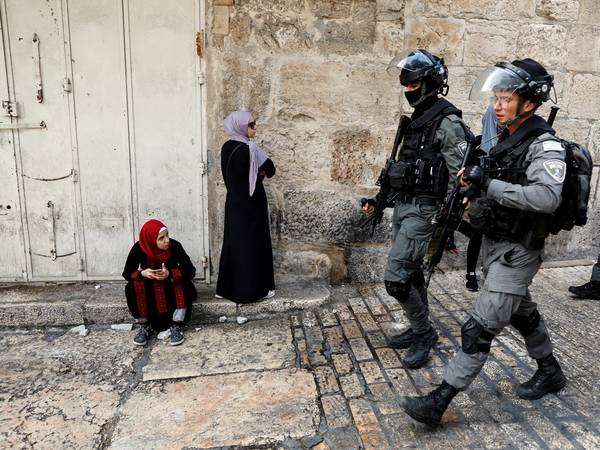Israel said it uncovered another Iran-backed spy operation following a wave of arrests over the past month, as spy cells are allegedly activated across the country.
Israel has historically been one of the toughest places to recruit spies and foreign operatives, but recent weeks have seen a surge in arrests of Jewish immigrants from Russia and Azerbaijan.
The latest citizens to be arrested were a married couple, Rafael and Lela Goliev, who live in the mixed Arab and Jewish city of Lod. The 32-year-olds were arrested after carrying out tasks on behalf of an Iranian infrastructure that recruits Israeli immigrants from the Caucasus countries, Israeli authorities say.
The investigation revealed that Rafael Goliev was recruited into the plot by fellow Azeri Elshan Agayev, 56, acting on behalf of Iranian officials.
“As part of the operation, Golayev carried out surveillance missions on security sites in Israel, including the Mossad's headquarters, and collected intelligence on an academic working at the Institute for Security Studies who the Iranians marked as an assassination target,” a statement from Israel Police said.
Goliev was also asked to locate a person who would serve as the assassin for the Iranian operation. Some of the tasks were carried out by Goliev with the help of his wife Lela who will be served with an indictment today.
The two, both of Azeri origin, had been in contact with the handler since 2021, but in the last month, it is the sixth cell busted for working for Iran. In the last year, the incidences have spiked, reaching a head in October with all the cases coming from either Russia or Azerbaijan.
Israel’s former head of Interpol, Asher Ben Artzi, told Iran International on Thursday as the news broke that the situation reflects a disconnected segment of Israel’s immigrant population. Following the collapse of the Soviet Union, several Jews used the right of return to move to Israel and thousands more Russians have fled to the Jewish state in the wake of the war in Ukraine.
“These people come from a very closed society, it’s not like native born Israelis who could never conceive of doing such a thing,” he said. “In all my years in the security services here, I never thought I would see this day. It’s a tragic thing that people who come here seeking refuge, can do this all for the pursuit of greed.”
Immigrants from the former Soviet Union tend to live in more closed communities and integrate less than other immigrants, as well as often being among the less economically well-off segments of the population.
Iranian-born Israeli Beni Sabti, also a researcher at the INSS, told Iran International that Iranians are catching “people or communities in Israel who are not paid enough and are dissatisfied in life”, a vulnerable sector of society which now numbers around one million of Israel’s 10 million population.
Ronen Solomon, an Israeli defense and intelligence analyst, told Iran International that using Azeri for communications may have revealed a gap in Israel’s monitoring capabilities, which are more robust for Persian and Hebrew languages.
Ben Arzti, a veteran of Israel’s security and intelligence sector, noted that Iran enjoys greater operational freedom in Azerbaijan, enabling it to potentially recruit and groom agents there for deployment to Israel.
Solomon further suggested that the recruited Azeris may come from Iran’s Azeri speaking population, making them especially vulnerable to recruitment efforts.
Like previous plots, Solomon said the fact they communicate on Telegram also exposes the weakness of the social media platform which protects the identity of users even when engaged in criminal activity.
Other targets of surveillance in the operation included the Moldovan consulate in Tel Aviv, the national electric company, the port of Haifa, public shelters in Tel Aviv, and graves of victims of the October 7 attacks.
According to the indictment, Goliev received an amount of approximately $600 for each day of surveillance and photography in the mission. His handlers ordered him to purchase an operational phone, high quality cameras, a laptop as well as to use the coding software they installed on the laptop, in order to transfer the information they collected safely. In total, the couple received around $26,000, the police said.
Tamir Hyman, the former head of Israeli defense intelligence and head of the INSS, told Israel’s Ynet: "It is not surprising that the members of the Institute for National Security Studies are a target for Iran and its proxies. Although the institute is an independent research institute, and is not part of the defense establishment, it is the leading defense research institute in Israel and as such, Iran seeks to harm its people.”
Last week, an indictment was filed against seven residents of northern Israel who operated as part of an organized squad recruited by an Iranian agent, and during the war engaged in information gathering and photography of military facilities and bases - among others, those that were the target of the Iranian missile attack on October 1.
